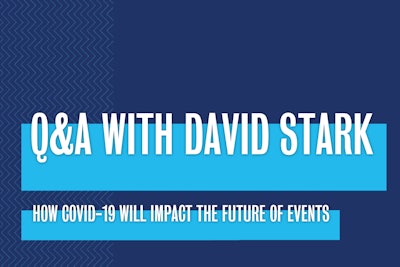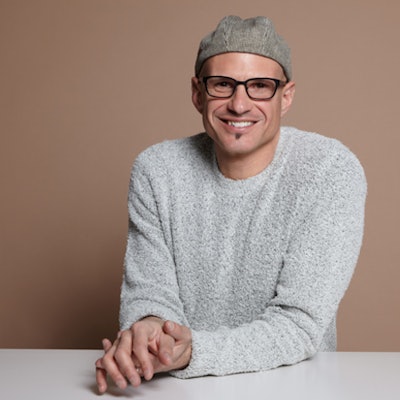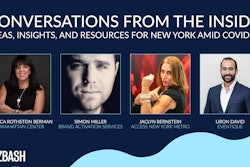
 Photo: Nico Iliev
Photo: Nico IlievLike everyone in the event world right now, industry stalwart David Stark is trying to deal with the effects of the COVID-19 pandemic on his business, navigate uncharted waters with his team, and figure out a new way forward. Despite the economic, emotional, and mental toll of the current situation, the New York-based event designer remains optimistic about the future of events and hopes this moment in time will inspire greater creativity and innovation within the industry.
Here, he chats with us about a new sense of community among his peers, the daily check-ins with his staff, and the silver lining he sees.
How has the pandemic affected the events you were working on?
Initially, the things that were immediately hit the hardest were the corporate events, and those were the things that we immediately started to reassess, whether to go forward or not… We were also bringing in people from other countries to New York and those projects were definitely the first to make other plans. I think the thing that’s really extraordinary about our world is that we’re so much more connected than we have ever been before, so when something is a challenge on a global scale, everybody feels it.
Do you see any similarities between now and the 2008 recession?
There were certainly a lot of things that were very difficult about 2008, and we all suffered through it and we all got through that together. But it wasn’t a situation where the economy stopped. It wasn’t a situation where everything just shut down. That business simply ended. We certainly did less events, but there were events.
 Waves of Benjamin Moore paint chips at the American Patrons of Tate’s Artists’ Dinner, which took place in May 2007.Photo: Courtesy of David Stark Design
Waves of Benjamin Moore paint chips at the American Patrons of Tate’s Artists’ Dinner, which took place in May 2007.Photo: Courtesy of David Stark Design
Our creative reaction to that was to create experiences that were out of materials that you would never think anybody would use like 10,000 paint strips from the hardware store. That was simply about ingenuity. That did not have a relationship to cost. They were not about somebody flexing a muscle about how much they could spend. They were more about a thoughtful idea that had a conceptual relationship to what the evening was about.
I really look at that time period as a very positive one because we were able to actually take the limitations that were thrust upon us and actually turn them into assets that were useful and that were ultimately profitable and ultimately creatively satisfying. I don't know what the answer to this time period is going to be. But I’m going to follow the path that we’ve always followed, which is to find that silver lining, and to find that positive new way forward and use it as a springboard to creativity and to partnership and to strengthen relationships.
Is there a silver lining to this situation?
One of the really strong things that’s come out of this is that community is the most important thing and that we’re all connected. We’re all negotiating these perils as a community without competing with each other. ... But especially with my colleagues, who at other times I might be considered in competition with, there’s been a great warmth and a great support system for each other [including] information sharing, best practices, a shoulder to cry on, sharing some jokes to lighten things up. We’re actually all in it together, and so navigating that as a community is a really great thing to come out of all this.
How are you managing your team right now?
One of the things we’ve been doing, and I’ve gotten great feedback on, is now that we’re working from home, every morning at 10 a.m. we have an all-team check-in via Zoom. The level of transparency, the level of daily group communication, the level of sharing of the challenges and successes, and really just what is happening in real-time with the business has been great for the entire team. Never before has everybody felt so connected.
I have had a sizable team, and we work within our individual teams, and while we’re all under the same roof, the individual teams are often siloed, and they might not be aware of the other projects that they’re not working on. The positive feedback that has come out of this kind of daily town hall that we hold online is that everybody feels really strongly about that connective tissue that is now holding us together, and [they] truly understand what is going on globally with our entire organization and the projects that are not in their particular project sphere and things that don’t even have to do with projects. We’re also sharing things. Each day, somebody takes the time to share a personal thing about what they’re all about.
Do I want to live inside a video conference for the rest of my life? Definitely not. But what we are finding is that there is lemonade to be made out of these lemons. Once we make it through this crisis, I think we’re definitely going to do a once-a-week meeting, which will pick up on some of the learnings and successes that this time period is teaching us.
How are you staying inspired?
I’ve definitely been looking at my bookshelf that is filled with all kinds of jewels that I knew were there but had forgotten to look at recently. So that’s a great source of inspiration for me. [Stark shares a different book from his bookshelf each day on his Instagram Stories.] I’m really moved by how people, in general, are being resourceful, whether they are posting craft ideas that they are creating out of everyday things they find at home. I’m moved by how people are using restrictions as a jumping-off point to make something new.
I’ve always believed that if you look at history the most exciting artwork has come out of times when there’s conflict. Whether that’s a war or that’s the AIDS crisis in the '80s and ‘90s, anything that’s conflicting breeds innovation, breeds new ways of thinking, and breeds new actions. Even in our own creative work, if someone says to me do whatever you want, I don’t have a single idea but if there are a lot of things for me to react to that are parameters or restrictions then naturally ideas flow. I’m very inspired by people who are already thinking that way.
Being inside my apartment does not feel like something that is a restriction. But I have been getting into a different side of myself, which is simpler. I realize I need less. And I’m very happy to be home cooking. I’m really enjoying that aspect of this. ... I’d sooner see the challenges that are forcing our hand as opportunities. There’s a lot to panic about, but I somehow try to look to the world around me to find the opportunity to make the lemonade out of it all. And while I’m certainly not erasing all the tragedy that is in front of us, I refuse to also be conquered by it.
What do you think the industry can learn from this?
It’s going to be a new world, and we’re going to have to evolve into what that new world means, especially for the event community. And it’s not going to be as simple as picking up where we left off. It’s going to be different. And rather than mourn that, I actually see that as a potentially exciting place for us to invent and create new opportunities within, and thinking a lot about the guest experience. How do we now make people feel comfortable? How do we now deal with content? How do we plan to band together?
Thinking about that guest experience and what partnership looks like with our clients might mean something different than what it had been, but I think there’s a lot of opportunity within that to forge exciting relationships. This is the time to really solidify a new way of working, where together we’re trying to work through these challenges, together we’re trying to forge a new way forward, and together we're trying to create a new way of looking at experiences. I truly believe that experiences will remain important. I just think we’re going to have to think about them in a slightly different way.
See BizBash's coverage of how COVID-19 is affecting the event industry at bizbash.com/coronavirus.



















